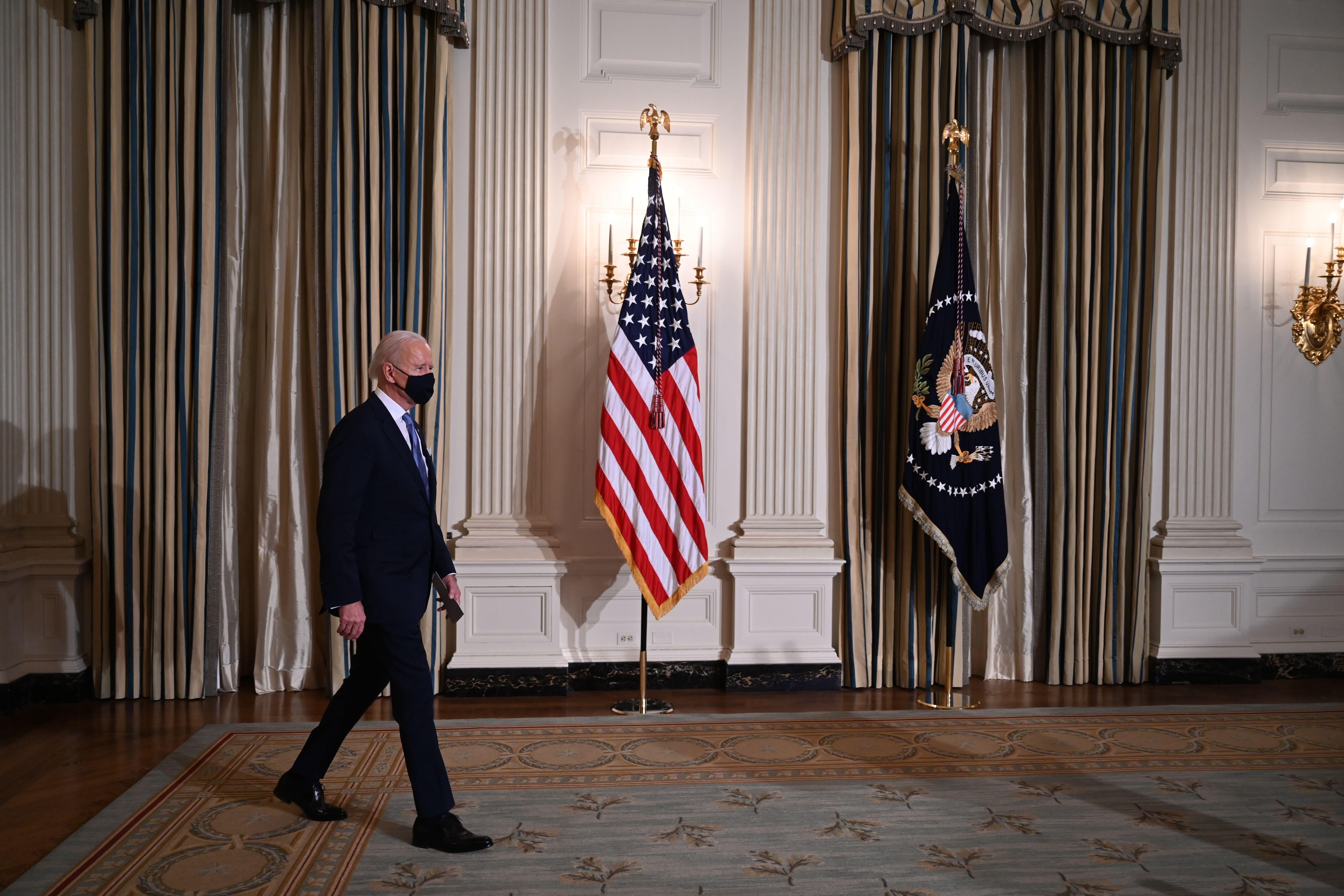Biden Has Already Fired Three of Trump’s Worst Appointees (original) (raw)

President Joe Biden arrives to swear in presidential appointees during a virtual ceremony at the White House. Jim Watson/Getty Images
Many of Donald Trump’s most notorious appointees, including his Cabinet secretaries, resigned shortly before Joe Biden took office. But myriad officials whom Trump installed in the executive branch remained in spite of their antagonism toward the new president’s agenda. Hours into his presidency, Biden has already ousted three of his predecessors’ most unqualified and corrupt appointees. This clean break sends a clear message that Biden will not tolerate hostile Trump holdovers in his administration, including those with time remaining in their terms.
First, Biden terminated Michael Pack, who was confirmed to head the U.S. Agency for Global Media in June. Pack sought to transform the agency, which oversees the international broadcaster Voice of America, into a propaganda outlet for Trump—despite a statutory mandate that prohibits such political interference. He purged the staff of VOA and its sister networks, replaced them with Trump loyalists, demanded pro-Trump coverage, and unconstitutionally punished remaining journalists who did actual reporting on the administration. In a perverse move, he refused to renew visas for foreign reporters who covered their home countries, subjecting them to retribution by authoritarian regimes. Pack also illegally fired the board of the Open Technology Fund, which promotes international internet freedom, and replaced them with Republican activists.
Following whistleblower complaints, the U.S. Office of Special Counsel found a “substantial likelihood” that Pack had violated federal law and engaged in “gross mismanagement.” He was eight months into his three-year term when Biden demanded his resignation shortly after taking the oath of office. In his resignation letter, Pack complained that his termination “will long be viewed as a partisan act” without any apparent sense of irony.
Second, Biden sacked Kathleen Kraninger, who was confirmed as director of the Consumer Financial Protection Bureau in 2018. Kraninger, who had no previous experience in consumer protection, immediately tried to undermine the agency’s role as a watchdog for the financial sector. She scrapped a landmark rule that restricted predatory payday lending, pressuring staff to downplay the resulting harm to consumers. And she refused to enforce a federal law that protected military personnel against a broad range of predatory lending. Her decision yanked federal support from military families who were defrauded by lenders. In the midst of the pandemic, Kraninger also approved a rule that allows debt collectors to harass Americans with limitless texts and emails demanding repayment.
Through the Dodd-Frank Act, Congress gave the CFPB’s director significant independence by barring the president from firing her over political disagreements. In 2020, though, the Supreme Court found this protection unconstitutional. Kraninger supported that decision, which paved the way for her termination on Wednesday. Had the court upheld the agency’s independence, Kraninger could have remained in office through the end of 2023.
Third, Biden demanded the resignation of Peter Robb, who was confirmed as the National Labor Relations Board’s general counsel in 2017. The NLRB was created to enforce federal laws that guarantee workers the right to form a union and bargain collectively. Yet Robb is vehemently anti-union; during his tenure, he tried to limit employees’ free speech, give managers more leeway to engage in wage theft, hobble unions’ ability to collect dues, and prevent employers from helping workers organize. He also tried to seize near-total control of the agency by demoting every regional director and consolidating power in his office. If successful, this gambit would’ve given him unprecedented authority to bust existing unions and prevent new ones from forming.
Robb’s term is set to end in November, but Biden has authority to fire him before then. On Wednesday evening, Robb announced that he would not step down voluntarily, stating that his resignation “would set an unfortunate precedent.” (In reality, the precedent has already been set: President Harry Truman demanded the resignation of NLRB general counsel Robert N. Denham in 1950 over political disputes.) Biden fired him shortly thereafter.
Pack, Kraninger, and Robb are the tip of the iceberg: Trump spent his presidency packing the federal government with Republicans eager to undermine the missions of the agencies they led. But Biden’s aggressive action upon taking office should be encouraging for progressives, since it indicates that the new president will move swiftly to fire Trump allies with high positions in the executive branch. Moreover, Biden should not have much trouble replacing these holdovers with Democrats in control of the Senate. (Republicans cannot filibuster nominees to the executive branch.) The new president undoubtedly faces legislative challenges ahead. But in the meantime, he can rapidly erase the legacy of the Trump administration by simply replacing Trump’s lackeys with qualified civil servants eager to do the job right.
Update, Jan. 20, 2021: This article has been updated to note that Peter Robb refused to step down.